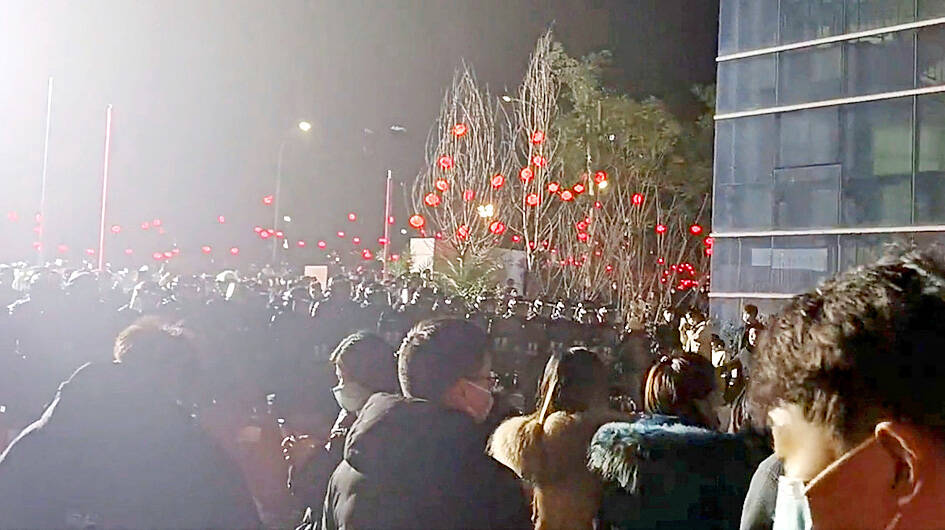Scores of workers have clashed with police at a COVID test kit factory in China, video spreading on social media showed yesterday, as the country navigates a path out of its “zero COVID-19” policy.
Footage geolocated to an industrial park in the southwestern city of Chongqing showed people tossing crates at a group of uniformed men, sending a shower of what appear to be test kits flying.
Another clip showed a crowd in front of a line of police officers at night as loudspeakers play a warning demanding they “cease illegal activities.”

Photo: Reuters
A man who posted video from the scene said in an accompanying caption that many workers had not been paid.
Other posts alleged that Chongqing-based pharmaceutical company Zybio Inc (中元匯吉) suddenly fired workers who had only been recruited weeks earlier.
Zybio did not immediately respond to requests for comment, while the local police department declined to comment.
“All the workers’ demands are economic in nature,” said a man in one video who called himself a “Marxist-Leninist-Maoist.”
He said there was no political motive behind the protest.
Agence France-Presse could not confirm exactly when the videos were captured, although multiple social media users said the clash took place on Saturday night into yesterday morning.
Distinctly patterned brown-and-white industrial buildings can be seen in the background of the videos, matching previous images of Zybio’s facility in the Dadukou District Jianqiao Industrial Park.
The hashtag “Chongqing Dadukou Pharmaceutical Factory” appeared to be censored on Sina Weibo yesterday, with only one post from the previous day still visible describing the protest as an “interesting topic.”
One video posted on a TikTok account belonging to a state-owned news company showed what it claimed was a street littered with antigen tests in a Chongqing industrial park.
“Sources say a labor dispute triggered conflict,” the caption read.
The video was taken down within hours.
Protests centered on labor issues and targeting individual companies occur frequently in China, despite official efforts to clamp down on unrest.
COVID-19 case numbers are presumed to have soared across the country, as the Chinese government moves away from its zero-tolerance approach to the virus, after strict COVID-19 curbs in November last year sparked some of the country’s worst unrest in years.

TRADE WAR: Tariffs should also apply to any goods that pass through the new Beijing-funded port in Chancay, Peru, an adviser to US president-elect Donald Trump said A veteran adviser to US president-elect Donald Trump is proposing that the 60 percent tariffs that Trump vowed to impose on Chinese goods also apply to goods from any country that pass through a new port that Beijing has built in Peru. The duties should apply to goods from China or countries in South America that pass through the new deep-water port Chancay, a town 60km north of Lima, said Mauricio Claver-Carone, an adviser to the Trump transition team who served as senior director for the western hemisphere on the White House National Security Council in his first administration. “Any product going

High above the sparkling surface of the Athens coastline, the cranes for building the 50-floor luxury tower centerpiece of Greece’s future “smart city” look out over the Saronic Gulf. At their feet, construction machinery stirs up dust. Its backers say the 8 billion euro (US$8.43 billion) project financed by private funds is a symbol of Greece’s renaissance after the years of financial stagnation that saw investors flee the country. However, critics see it more as a future “ghetto for the rich.” It is hard to imagine that 10km from the Acropolis, a new city “three times the size of Monaco”

STRUGGLING BUSINESS: South Korea’s biggest company and semiconductor manufacturer’s buyback fuels concerns that it could be missing out on the AI boom Samsung Electronics Co plans to buy back about 10 trillion won (US$7.2 billion) of its own stock over the next year, putting in motion one of the larger shareholder return programs in its history. South Korea’s biggest company would repurchase the stock in stages over the coming 12 months, it said in a regulatory filing on Friday. As a first step, it would buy back about 3 trillion won of paper starting today up until February next year, all of which it would cancel. The board would deliberate on how best to effect the remaining 7 trillion won of buybacks. The move

In a red box factory that stands out among the drab hills of the West Bank, Chat Cola’s employees race to quench Palestinians’ thirst for local products since the Gaza war erupted last year. With packaging reminiscent of Coca-Cola’s iconic red and white aluminum cans, Chat Cola has tapped into Palestinians’ desire to shun brands perceived as too supportive of Israel. “The demand for [Chat Cola] increased since the war began because of the boycott,” owner Fahed Arar said at the factory in the occupied West Bank town of Salfit. Julien, a restaurateur in the city of Ramallah further south,